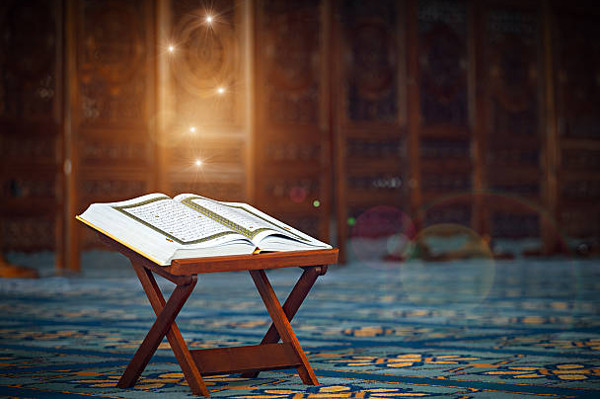
1. Upon completion of the Quraan Majeed, you should engage in dua as this is a time when duas are accepted.
عن ثابت أن أنس بن مالك كان إذا ختم القرآن جمع أهله وولده فدعا لهم (المعجم الكبير للطبراني، الرقم: ٦٧٤)[1]
Hazrat Thaabit (rahimahullah) reports that whenever Hazrat Anas bin Maalik (radhiyallahu ‘anhu) would complete the Quraan Majeed, he would gather his family and children and thereafter make dua for them.
عن إبراهيم التيمي عن عبد الله بن مسعود قال: من ختم القرآن فله دعوة مستجابة قال: فكان عبد الله إذا ختم القرآن جمع أهله فدعا وأمنوا على دعائه (فضائل القرآن للقاسم بن سلام صـ ١٠٨، فضائل القرآن لابن الضريس، الرقم: ٧٦)
Ebrahim Taimi (rahimahullah) reports that Hazrat Abdullah bin Mas’ood (radhiyallahu ‘anhu) said, “Whoever completes a full recital of the Quraan Majeed then (he should make dua as) his dua will be accepted,” Ebrahim Taimi (rahimahullah) thereafter mentioned that whenever Hazrat Abdullah bin Mas’ood (radhiyallahu ‘anhu) would complete a full recital of the Quraan Majeed, he would gather his family and engage in dua, and they would say aameen to his dua.
عن حميد الأعرج قال: من قرأ القرآن ثم دعا أمن على دعائه أربعة آلاف ملك (سنن الدارمي، الرقم: ٣٥٢٤)[2]
Hazrat Humaid (rahimahullah) mentioned, “The one who recites the Quraan Majeed and thereafter engages in dua, four thousand angels say aameen to his dua.”
2. It is not permissible for a person in the state of janaabah or a woman in the state of haidh to recite the Quraan Majeed. However, it is permissible for them to recite those aayaat in the Quraan Majeed which are duas (supplications) to Allah Ta‘ala as well as those aayaat which are recited for protection against shayaateen, evil, etc. When they recite these aayaat, they should recite them with the niyyah (intention) of dua and isti’aazah (seeking Allah’s Ta‘ala Divine protection). They should not recite them with the niyyah of tilaawat (recitation).[3]
عن ابن عمر عن النبي صلى الله عليه وسلم قال: لا تقرأ الحائض ولا الجنب شيئا من القرآن (سنن الترمذي، الرقم: ١٣١)[4]
Hazrat Ibnu Umar (radhiyallahu ‘anhuma) reports that Hazrat Rasulullah (sallallahu ‘alaihi wasallam) said, “A person in the state of haidh or janaabah should not recite any portion of the Quraan Majeed.”
3. It is not permissible for one to recite any portion of the Quraan Majeed or to take the name of Allah Ta‘ala while in the toilet. Similarly, if one has a ring or chain upon which the name of Allah Ta‘ala or any verse of the Quraan Majeed is inscribed, then he should remove it before entering the toilet.[5]
عن أنس قال: كان رسول الله صلى الله عليه وسلم إذا دخل الخلاء نزع خاتمه (سنن الترمذي، الرقم: ١٧٤٦)
Hazrat Anas (radhiyallahu ‘anhu) reports that Hazrat Rasulullah (sallallahu ‘alaihi wasallam) would remove his ring when he entered the toilet (as it had the name of Allah Ta‘ala inscribed on it).[6]
4. If you wish to change your clothes in a room where the Quraan Majeed is kept, then you should first place the Quraan Majeed in the cupboard, drawer, etc. before undressing. Undressing in the presence of the Quraan Majeed is against the respect of the Quraan Majeed.
5. If you recite a verse of sajdah or listen to it being recited, then it will be waajib (compulsory) upon you to make the sajdah. The manner of making the sajdah-e-tilaawat is that you will say the takbeer and go into the posture of sajdah. Thereafter, you will say the takbeer and rise from sajdah. It is mustahab to make the sajdah from the standing posture. However, if this is difficult, then it is permissible to perform the sajdah from the sitting posture.[7]
عن أبي هريرة قال: قال رسول الله صلى الله عليه وسلم: إذا قرأ ابن آدم السجدة فسجد اعتزل الشيطان يبكي يقول: يا ويله وفي رواية أبي كريب: يا ويلي أمر ابن آدم بالسجود فسجد فله الجنة وأمرت بالسجود فأبيت فلي النار (صحيح مسلم، الرقم: ٨١)
Hazrat Abu Hurairah (radhiyallahu ‘anhu) reports that Hazrat Rasulullah (sallallahu ‘alaihi wasallam) said, “When the son of Aadam (‘alaihis salaam) recites an aayat of sajdah and then makes sajdah, Shaitaan moves away whilst crying, saying, ‘Destruction to me! The son of Aadam (‘alaihis salaam) was commanded to make sajdah and he made sajdah, therefore he will receive Jannah. I was commanded to make sajdah and I refused, therefore I will receive the fire of Jahannum.’”
[1] وقال العلامة الهيثمي رحمه الله في مجمع الزوائد، الرقم: ١١٧١٣: ورجاله ثقات
[2] قال الحافظ في نتائج الأفكار (١٧٧/٣): هذا أثر منقطع وسنده ضعيف من أجل قزعة وحميد
[3] (و) يمنع حل (دخول مسجد (و) حل (الطواف) ولو بعد دخولها المسجد وشروعها فيه (وقربان ما تحت إزار) يعني ما بين سرة وركبة ولو بلا شهوة وحل ما عداه مطلقا وهل يحل النظر ومباشرتها له فيه تردد (وقراءة قرآن) بقصده (ومسه) ولو مكتوبا بالفارسية في الأصح (وإلا بغلافه) المنفصل كما مر
قال العلامة ابن عابدين – رحمه الله -: (قوله: بقصده) فلو قرأت الفاتحة على وجه الدعاء أو شيئا من الآيات التي فيها معنى الدعاء ولم ترد القراءة لا بأس به كما قدمناه عن العيون لأبي الليث وأن مفهومه أن ما ليس فيه معنى الدعاء كسورة أبي لهب لا يؤثر فيه قصد غير القرآنية (رد المحتار ٢٩١/١)
[4] قال العلامة علي القاري رحمه الله: (رواه الترمذي): ورواه ابن ماجه وضعفه البخاري والترمذي والبيهقي وغيرهم نقله السيد عن التخريج لكن له متابعات كما ذكره ابن جماعة وغيره تجبر ضعفه ومن ثم حسنه المنذري ورويت أحاديث بمعناه كلها ضعيفة (مرقاة المفاتيح ٤٣٩/٢)
[5] ويكره الدخول للخلاء ومعه شيء مكتوب فيه اسم الله أو قرآن (مراقي الفلاح صــ ٥٤)
يكره أن يقرأ القرآن في الحمام لأنه موضع النجاسات ولا يقرأ في بيت الخلاء كذا في فتاوى قاضي خان (فتاوى الهندية ٣١٦/٥)
[6] وقال: هذا حديث حسن صحيح غريب
[7] سببه التلاوة على التالي والسامع في الصحيح وهو واجب على التراخي إن لم يكن في الصلاة (مراقي الفلاح صــــ ١٨٤)
فإذا أراد السجود كبر ولا يرفع يديه وسجد ثم كبر ورفع رأسه ولا تشهد عليه ولا سلام كذا في الهداية ويقول في سجوده سبحان ربي الأعلى ثلاثا ولا ينقص عن الثلاث كما في المكتوبة كذا في الخلاصة. وهو الصحيح هكذا في فتاوى قاضي خان ولو لم يذكر فيها شيئا يجزيه كما في المكتوبة كذا في الخلاصة ويرفع صوته بالتكبير والمستحب أنه إذا أراد أن يسجد وإذا رفع رأسه من السجود يقوم ثم يقعد كذا في الظهيرية ثم إذا أراد السجود ينويها بقلبه ويقول بلسانه أسجد لله تعالى سجدة التلاوة الله أكبر كذا في السراج الوهاج (الفتاوى الهندية ١٣٥/١)
 Ihyaaud Deen An Effort to Revive Deen in Totality
Ihyaaud Deen An Effort to Revive Deen in Totality



